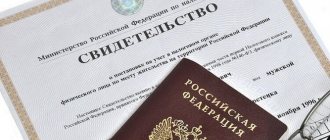Where to start, where to turn? List of required documents Time and cost Result Possible problems
Find out on our website whether you need to apply for registration at a new place of residence, as well as how things are going with registration in a mortgaged apartment, and what the bank’s reaction is to the registration of strangers in it.
Legislative norms
When looking for an answer to the question of how to register in an apartment (in a privatized apartment), you should study the legislative norms that indirectly or directly regulate migration registration issues. This database is quite large and is represented by the following documents:
- Civil Code of the Russian Federation. It regulates the rights of the homeowner.
- Housing Code of the Russian Federation. Establishes registration rules.
- Law No. 5242/1 of June 25, 1993 grants citizens the right to free movement within the state.
- Government Decree No. 713. It presents the main provisions for registering.
- Code of Administrative Offences. Establishes a fine for the absence of registration for longer than the established period.
- Criminal Code of the Russian Federation. Defines liability for false registration.
A lawyer answers questions about registration and discharge
Links to legislative acts
- Article 2 of the Law of the Russian Federation “On the right of citizens of the Russian Federation to freedom of movement, choice of place of stay and residence within the Russian Federation.” Basic Concepts
- Article 3 of the Law of the Russian Federation “On the right of citizens of the Russian Federation to freedom of movement, choice of place of stay and residence within the Russian Federation.” Registration of citizens of the Russian Federation at the place of stay and place of residence within the Russian Federation
- Article 6 of the Law of the Russian Federation “On the right of citizens of the Russian Federation to freedom of movement, choice of place of stay and residence within the Russian Federation.” Registration of a citizen of the Russian Federation at the place of residence
- Paragraphs 16, 17, 18 of the Decree of the Government of the Russian Federation of July 17, 1995 No. 713 “On approval of the Rules for registration of deregistration of citizens of the Russian Federation at the place of stay and place of residence within the Russian Federation”
- List of persons responsible for accepting and transferring to the registration authorities documents for registration and deregistration of citizens of the Russian Federation at the place of stay and place of residence within the Russian Federation" Resolution of the Government of the Russian Federation of July 17, 1995 No. 713
- Appendix No. 5 of the Administrative Regulations of the Ministry of Internal Affairs of the Russian Federation for the provision of public services for registration of citizens of the Russian Federation at the place of stay and place of residence within the Russian Federation,” approved by Order of the Ministry of Internal Affairs of the Russian Federation No. 984 of December 31, 2017.
- Points 2, 2.2, 23, 24, 26.1, 32, 33, 34, 48, 49, 50, 52, 56.2, 57, 58, 60, 62, 63, 80, 82, 86, 87, 90, 91, 92 , 93, 97, 99, 102, 118.2, 118.2.1, 118.2.2, 118.5, 118.7, 118.7.1, 119, 121, 123, 139, 140, 143, 144, 149, 151 of the Administrative Regulations of the Ministry of Internal Affairs of the Russian Federation on providing public service for registration of citizens of the Russian Federation at the place of stay and place of residence within the Russian Federation,” approved by Order of the Ministry of Internal Affairs of the Russian Federation No. 984 of December 31, 2017.
Without ownership
Any citizen registered in the residential premises of another person has no property rights, even if permanent registration has been issued. Registration in a privatized apartment only provides the right to use the apartment. Despite the fact that a person does not have the right to fully dispose of the premises, this can still lead to serious problems in the future. Most often they are as follows:
- Refusal to check out of the apartment.
- Registration of children without notifying the owner. You need to understand that it is almost impossible to discharge minors, even through the court.
- Refusal to evict. The registered person has full right to reside in the given territory.
It is important to know that citizens registered before privatization can claim a share in the apartment. Even if they refuse it, it will be very difficult to discharge them.
To avoid problems of this kind, an agreement on the use of residential premises should be drawn up. It describes all the nuances and duration of a citizen’s stay. In addition, it is useful to have this agreement certified by a notary. Then, during legal proceedings, the agreement will be considered as evidence.
Possibilities
Is it possible to register a person in an apartment? The answer to the question depends on what type of property we are talking about.
How to register a stranger into a privatized apartment? If this is privatized real estate, then the owner has the right to register anyone: a relative or a stranger, even a tenant.
also no restrictions on the number of .
How to register a non-relative in an apartment if it is not privatized? When it comes to municipal property, in order to register an outsider, the employer will have to seek approval from the landlord.
It is impossible to carry out the procedure without his consent . The employer himself and everyone who is already registered in the residential premises must also agree to this.
When registering strangers for municipal housing, the living space standards per resident are taken into account. If there are not enough of them, then cannot there .
The exception is children under 18 years of age. If one of the parents is already registered in the housing, regardless of the form of ownership and the presence of a family connection with the owner (tenant), the child will be registered without the consent of these persons.
You can find out how many people can be registered in one apartment from our article.
Registration of spouses
The husband's registration in the wife's privatized apartment (and vice versa) is carried out according to the general rules, if the premises have already been privatized earlier and have an owner in the person of one of the spouses.
If this process is just being planned, then it should be understood that the square meters will belong to both the husband and wife. If one of them refuses, the applicant receives untimely registration. This has the following features:
- Check-out from the apartment will be possible only with voluntary consent.
- In case of divorce, registration (registration) is not cancelled.
- The former spouse will be able to live in the residential premises for as long as he sees fit, and also register children there (even from another marriage).
Risks and consequences
If you register a person in an apartment, what consequences might there be? What are the risks when registering a stranger? The owner bears certain risks when he registers a stranger in the residential premises. Among the risks and negative consequences are :
- the impossibility of discharging a stranger without a trial if he is against it;
- the emergence of the right to use living space and live in it;
- the ability for a stranger to register a child in the apartment, since no one’s consent is required.
As a result, by registering a stranger, you can end up with an unwanted tenant and litigation.
The registration of someone else does not give him the right to claim property , since it does not give anyone the right of owner.
In addition, if there are many people registered in the living space, they are not relatives of the owner and do not actually live there, criminal liability for providing fictitious registration is possible.
You can learn about the difference in the concepts of “registration” and “registration”, as well as how temporary registration differs from permanent registration on our website.
Registration of relatives
Do you want to register in an apartment, but don’t know how to register with relatives in a privatized apartment? The process of registering relatives is carried out on a general basis. The only peculiarity is that if you indicate your relationship in the application, you will not have to submit a certificate confirming your resident status to the authorized bodies. This simplifies the process.
Some people are concerned about how to register with their parents in a privatized apartment. If we are talking about adult children, then the registration process with parents is standard.
To avoid conflict situations in the future, it is also recommended to enter into agreements with relatives. This is especially true when it comes to permanent registration. The residence agreement can be concluded in the following form:
- Lease agreement.
- Agreement on free use of premises.
- Other types of written agreement within the scope of the law.
In addition, you should protect yourself in such matters as the length of residence of a person registered on a permanent basis. To do this, the document should note:
- Situations in which the tenant is obliged to voluntarily check out of the apartment.
- Conditions when a resident must move out.
- Impossibility of registering other persons in the apartment, with the exception of children. It is impossible to prohibit the registration of children, since a minor child is registered in the same place as the parent.
- Inability to manage square meters, rent them out, sublet them, etc.
Step-by-step instruction
- If you have registration in another place of residence, you must register. This rule applies if you have a residence permit in another city. We wrote about how to check out of an apartment and register in another one here.
- It is necessary to resolve the issue with the owner of the apartment.
- Go to the passport office together.
- An application form No. 6 is filled out.
- A package of collected documents is provided.
- The owner gives written consent to the registration.
- The registrar checks the presence of the owner and reviews the submitted documents.
- The registrar takes the passport.
- A certificate is issued that contains the deadline for appearance.
- On the specified date, a person seeking registration must appear at the passport office, where he will pick up a stamped passport.
Where to go?
Most often, registration is completed at the passport office of the management company. Also, this may be the passport office of housing and communal services, HOAs and other organizational and legal forms of managing an apartment building.
If there is no or impossibility of contacting such organizations, you can contact the Federal Migration Service.
What documents are needed?
All documents listed below must be available in the form of originals and photocopies.
- Passport of the owner of real estate.
- Passport of the registered person.
- A certificate of title or other document showing the title to the property.
- Departure sheet (if available).
- Written consent of the owners to carry out the procedure.
- If there is a legal representative in the case, a notarized power of attorney.
- Application on form No. 6.
If you save your time, you can make an application at home.
This is what the departure sheet looks like:
Where to submit?
Documents are collected in a single folder and checked for legality. They are provided to the passport office of management organizations or to the window of the nearest FMS office. No other organizations are anymore authorized to carry out similar procedures.
Deadlines
The passport office has established regulations that suggest that the procedure for stamping a new registration address will take from 3 to 7 calendar days. An employee of the registration authority will tell you the exact date.
Cost and state duty
The procedure for deregistration and subsequent transfer to a privatized apartment does not involve any fees in the form of state duties and taxes relative to the state. This procedure will be absolutely free for you.
But, if citizens, after the deregistration procedure has taken place, do not register at their new place of residence within 7 days, then the administrative code imposes liability on them, which provides for the payment of up to 3,000 rubles. fine in favor of the state.
What comes after?
After carrying out such a procedure, the registration authority issues the citizen a passport, which contains a stamp indicating the presence of a new registration . The passport office does not issue any more documents.
This registration mark is placed on the identity document and does not require additional confirmation.
This is what the registration mark in the passport looks like:
Features and nuances
If for some reason the owners are against your registration or the registration authority refuses to carry out a similar procedure in relation to you, but you believe that your demands are legitimate, you can file a claim in court. To do this, you need to draw up a statement of claim and attach papers proving your case.
Minor owner
Who has the right to register citizens in an apartment if its owner is a minor child? In this case, only the guardianship authorities can issue permission. This measure is necessary, since it is the only way to protect the child from all kinds of manipulation.
Obtaining consent for registration from the guardianship authorities is a key point in this situation. Therefore, you should first visit the guardianship council, and then go to other government agencies dealing with the issue of registration.
Forms
All necessary forms for registration can be downloaded here in MS-Word format:
- Application for registration at the place of residence according to form No. 1;
- Arrival address sheet according to form No. 2;
- Certificate of registration at the place of residence in form No. 3;
- Journal of applications according to form No. 4;
- Questionnaire according to form No. 5;
- Application for registration at the place of residence according to form No. 6;
- Departure address sheet according to form No. 7;
- Certificate of registration at the place of residence according to form No. 8;
- Registration card according to form No. 9;
- Apartment card in form No. 10;
- House (apartment) book according to form No. 11;
- Sheet of statistical registration of arrival according to form No. 12P;
- Sheet of statistical accounting of disposals according to form No. 12B;
- Journal of applications according to form No. 13;
- Notification of deregistration of dream residence in form No. 14.
Possible problems
Before registering a person in a privatized apartment, you should carefully weigh everything and think about the consequences. They may be as follows:
- Refusal of a citizen to be discharged. If it was registered on the premises before privatization, then even the court will not be able to resolve the issue.
- Registration of other strangers, including children, as a registered person. The likelihood that they can be discharged before reaching adulthood is very low.
- Reluctance to leave the apartment. A person's permanent registration in a privatized apartment gives him the right to live in this living space until he is discharged.
When registering for temporary registration, such problems do not arise, since the nuances and terms of residence are specified in the contract. At the end of the agreement, the tenant loses all rights. They can only be restored by extension.
Rent amount
The increase in the cost of utilities should not frighten those who have meters for water, electricity and gas. The price will increase only for what can be spent.
This means that the number of residents is multiplied by the tariff and the amount required to be paid is obtained. All this can be found out by looking at a regular receipt. At the same time, payments for heating, elevators, garbage chutes, housing maintenance and major repairs will remain the same, since they do not depend on the number of people living in a given area.
The only thing is, since one or more people will live in the apartment, the amount of light, water and gas consumed will increase, and subsequently the amount on the receipt will increase. If you do not want to pay for what your tenants “attacked,” then this point should be discussed and written down in the contract in advance.
Temporary registration and utility payments are a separate topic, important not only for the owner, but also for other citizens registered in the apartment.
The answer to the question whether the rent increases during temporary registration is determined only by the presence of water, electricity and gas meters in the apartment. In the absence of such, payment for housing is calculated in accordance with tariffs multiplied by the number of residents.
The receipt for payment of utility bills and rent contains comprehensive information about the tariffs and the purpose of each item required for payment. Sections such as payment for an elevator, garbage chute, heating, and utility repairs depend on the number of square meters in the housing area and are not tied to the number of residents. In these payment items, the question of whether the number of people registered affects the rent has a negative answer.
For apartments with meters, the remaining expense items directly indicate the values shown by the metering devices, and also do not depend on the number of residents in the apartment.
That is, for housing equipped with meters, the number of registered ones does not matter. Another thing is that when another citizen lives, the consumption of water, electricity and gas will inevitably increase, which will affect the amount of utility bills. Therefore, when temporarily registering a citizen, it is necessary to discuss this issue and fix the procedure and amount for him to pay his part of the utility bills.
Registration in a privatized apartment: rights
What does registration give? After this procedure, a person receives the right:
- Contact medical institutions at your place of residence.
- Get a job in any organization without any problems.
- Form an individual entrepreneurship.
- Receive benefits.
- Place your children in school or kindergarten.
- Use the water supply, plumbing, and balcony (or loggia) available in the apartment. If the homeowner agrees, you can also use furniture and other items in the house.
However, do not forget that this does not give ownership rights.
Resolution of controversial situations
Almost all controversial situations that arise when resolving housing issues are resolved in court. The owner has full right to dispose of the apartment and has the right to register and discharge residents from it at his own discretion at any time. Forced discharge of temporary residents before the end of their term is also carried out through the court.
When determining what the owner faces with temporary registration, the practice of litigation on housing legislation does not provide critical examples indicating that the owner of a property has lost his rights in whole or in part due to the registration of temporary residents in his property.
The main appeals to the court on issues of temporary registration:
- refusal of voluntary eviction;
- antisocial behavior of temporary residents or refusal to pay rent;
- registration of temporary registration without the consent of the owner or failure to indicate the final date of registration.
The reasons listed last in this list are possible when filing an application by mail or electronically. In all other cases, the presence of the owner is mandatory and he has the right to control the completion of a satisfactory temporary registration period specified in the application for a certificate of registration at the place of residence.
If you still have questions about the dangers of temporary registration for the owner, then ask them in the comments
Is the consent of others required?
Government Decree No. 713 of 1995 establishes a complete package of documentation that is necessary to carry out the registration process in privatized housing. From the text of this document it follows that registration requires only the consent of the owner.
In practice, many are faced with a situation where the competent authorities request the consent of everyone who lives on the square meters in question.
How to register with your husband in a privatized apartment? Will the consent of others be required? If the premises are owned by several people, then registration will not be possible without their consent. If only the husband is the owner, and the other residents are simply registered there, then you do not need to obtain any approval from them.
Is it possible to register a child in a privatized apartment without obtaining the consent of the other residents? In this regard, the law states that a minor child is registered where his parent is registered. The procedure does not require anyone's approval, including the owner.
Is it possible to register an outsider?
The legislation does not prohibit the owners of residential premises from registering strangers, but here it is worth considering a number of inconveniences that may arise after receiving a mark in the passport :
- The owner of the apartment will not be able to freely dispose of his property: for example, when selling, the consent of all registered residents will be required.
- If you register a stranger who has a minor child in the living space, he will be able to register him without the consent of the owner, and he will be able to register him only after he reaches the age of majority.
It is also worth considering the type of property:
- Privatized apartment. Any person can be registered, because the owner is free to independently dispose of his property. The number of registered persons is not limited by law.
- Municipal. Here, the consent of the landlord and all citizens registered in the living space will be required.
If the living space was purchased with a mortgage and the debt has not yet been repaid, it is necessary to obtain the approval of a credit institution to register a stranger or relative there.
Have a question or need legal help? Take advantage of a free consultation:
Free legal advice by phone:
8 (Moscow and Moscow Region) 8 (St. Petersburg and Leningrad Region) 8 (Regions of the Russian Federation)
Advice from lawyers
Do you want to register in an apartment, but don’t know how to do this in a privatized apartment? First, you need to obtain the consent of the owner or owners (if there are several of them). After this, you should find out what documents are required in your particular case. and start preparing them. As a rule, this is a simple task that everyone can easily cope with. Next, you need to find out where they apply for registration. Where to submit documents? All processes related to registration and deregistration are resolved in the Main Directorate for Migration Issues of the Ministry of Internal Affairs of Russia. We'll tell you where to apply next.
Timing and cost
How long to wait for the result? The processing time directly depends on the place of application. For example, the Main Department of Internal Affairs of the Ministry of Internal Affairs of Russia has the shortest processing time, which is 3 days . In other places of application, the waiting period will be on average 6-7 days .
How much does it cost?
registration procedure is absolutely free . It does not require any mandatory payments and is not subject to state duty.
This means that the costs can only be additional. For example, if the applicant resorted to the help of a representative under a power of attorney, he can pay for the corresponding services .
What documents are issued as a result?
When an adult is registered in a privatized home, a mark (stamp) is placed to confirm that the procedure has been completed.
If the registered person has not reached the age of 18 , then he is issued a separate certificate of registration. All additional registration certificates are issued separately upon written request.
List of documents
How to register in a privatized apartment? To do this, you will need to provide some documents to the authorized bodies. In this case, you will need the following documents:
- Identification card or birth certificate for a minor.
- Completed application form.
- Certificate of ownership.
- Technical and cadastral documentation.
- Written consent of all owners (if there are several).
- Power of attorney from the applicant if he cannot be present in person.
How to register a person in a privatized apartment? In an apartment that is the property of a certain person, you can register a stranger or a loved one by contacting the Main Directorate for Migration Issues of the Ministry of Internal Affairs of Russia. You can submit documents to the territorial office. In this case, the applicant does not involve intermediaries, but applies directly to the agency dealing with such issues. To reduce the workload of the organization, other structures were involved. It may be more convenient for some citizens to apply in other ways:
- Through the passport office at the location of the property.
- Don’t know how to register with your wife in a privatized apartment? Please submit a corresponding application to the multifunctional center.
- Through the Internet and the GosGosuslugi portal.
In this case, the owner will not need to visit an authorized organization. In this case, the owner is sent a notification of the intention to register on his square meters. According to legal norms, he can cancel the process of obtaining temporary registration at any time. Also, many people are interested in whether it is possible to check out without the presence of the owner. Any citizen has the right to withdraw from temporary or permanent registration at his own request. You do not need to obtain the owner's consent for this. His presence is also not mandatory. During the discharge process, the applicant must indicate the new address at which he is leaving.
What serves as confirmation of completed registration?
What kind of confirmation of registration a registrant will receive depends on whether the registration has a time frame or is issued for an unlimited time.
- Permanent registration is recorded with a stamp in the passport.
- If necessary, a citizen may additionally ask for a certificate indicating the place of his registration.
- A Certificate of Registration at the place of residence is issued for a minor child.
- Temporary registration is confirmed by a special certificate, which indicates the address and validity period of registration.
Registration in municipal real estate
What to do if the apartment is not privatized? How to register in this case? In municipal housing, a slightly different registration procedure applies. This is due to the fact that the owner of the property is the municipality. In addition, in this situation, the rights of registered citizens are different: they have the opportunity to further participate in privatization actions and the right to register in order to improve their living conditions.
You can register in a municipal apartment under the following conditions:
- The presence of all adults registered in the premises during the procedure.
- Obtaining consent for registration from the local administration.
In accordance with current legislation, the main tenant has the right to contact the authorized bodies regarding the registration of family members, immediate relatives and strangers in their living space. For registration of blood relatives, the consent of the municipality is not required, and the issue of registration of strangers must be agreed upon.
To carry out registration actions, the following documents will be required:
- Passports of all participants.
- Birth certificates (if children are involved).
- Apartment rental agreement.
- Marriage certificate (if a spouse is registered).
- Certificate of family composition.
- Written consent of all adult registered residents.
- Elimination sheet (if available).
When registering minor children as a tenant, the consent of the others is not required.
Communal apartment
Unfortunately, there are no fewer communal apartments these days. On the contrary, very often former close people become strangers, divide their accounts and either live in the same area as in a communal apartment, or sell their part to others.
Communal housing is housing in which several owners live (and they can be not only individuals, but also the municipality), they have a living space allocated for each, as well as places for common use.
How to register another person in a communal apartment? The owner of a communal apartment has all the rights of an ordinary, sole owner. He can register anyone for his living space, the main thing is that this area is allocated in the form of a separate room.
If the communal apartment belongs to the municipality, then the rules of the municipal apartment apply. When registering other persons, it is necessary to obtain permission from the Department and other persons registered. When receiving permission from the municipality, compliance with area standards also plays a big role.
2 room apartments on Moskovsky Prospekt Go to
The difference between an owner and a tenant
What is the difference between the rights of an owner and a registered person?
A registered person can perform actions, so to speak, of a notification nature - to receive all those civil benefits and opportunities that registration in his area provides, such as: enrolling a child in a kindergarten or school, receiving subsidies, Taxpayer Identification Number, obtaining an insurance certificate.
He can also register his young child for living space without asking anyone (Article 20 of the Civil Code).
But that's not all. The owner may (in addition to the above):
- register and deregister citizens of the Russian Federation regardless of the degree of relationship (Articles 31 and 35 of the Housing Code);
- sell living space, donate it, transfer it by inheritance, make it the subject of collateral, arrange redevelopment of the apartment (Article 30 of the Housing Code).
If we talk about who has more advantages, then it becomes obvious that the owner - if we are talking about private property, since only he, and not the tenant, is its sovereign manager.
Another thing is municipal square meters. Here the owner of the housing is the state, and all official residents have equal rights with each other. And for any legal action with the apartment, everyone’s consent is required.
The person registered may even give up his share during privatization. True, such a gesture of generosity still does not deprive him of his rights - the citizen will have the right to live in the living space until the end of his days.
However, it is still impossible to say that the owner is the king and God. For example, even after the registration period has expired, he cannot take and put annoying guests out into the entrance or, as is often done, throw their things from the balcony. Eviction and forced deregistration are the exclusive prerogative of the court.
If you do not live on site
What rights do a person who is registered but does not live have? The same as for the living tenant.
Currently, in the legislation of the Russian Federation there is no concept of “registration without the right of residence”
It is very easy to register, despite the seemingly large list of documents. Deregistration will be more difficult, especially for the apartment owner.
This, of course, is not a reason to isolate yourself from relatives and loved ones - this is a reason to seriously think and discuss the situation before starting any transactions.
If you find an error, please highlight a piece of text and press Ctrl Enter.











